Summaries of Judgments, Advisory Opinions and Orders of the International Court of Justice
request, the Court has failed in this duty. The Court's decision to answer the question posed by the General Assembly is as erroneous as it is regrettable.
As to the majority's attempt to interpret Security Council resolution 1244 with respect to the UDI, Judge Skotnikov points out that, unfortunately, in the process of doing so, the majority has drawn some conclusions, which simply cannot be right.
One of these is finding that resolution 1244, which had the overarching goal of bringing about "a political solution to the Kosovo crisis" (res. 1244, operative para. 1), did not establish binding obligations for the Kosovo Albanian leadership (see Advisory Opinion, paragraphs 117 and 118). The Security Council cannot be accused of such an omission, which would have rendered the entire process initiated by resolution 1244 unworkable.
No less striking is the Court's finding to the effect that "a political process designed to determine Kosovo's future status, taking into account the Rambouillet accords" envisaged in resolution 1244 (res. 1244, operative para. 11 (e)), can be terminated by a unilateral action by the Kosovo Albanian leadership (see Advisory Opinion, paragraphs 117 and 118). In other words, the Security Council, in the view of the majority, has created a giant loophole in the régime it established under resolution 1244 by allowing for a unilateral "political settlement" of the final status issue. Such an approach, had it indeed been taken by the Council, would have rendered any negotiation on the final status meaningless. Obviously, that was not what the Security Council intended when adopting and implementing resolution 1244.
Finally, the authors of the UDI are being allowed by the majority to circumvent the Constitutional Framework created pursuant to resolution 1244, simply on the basis of a claim that they acted outside this Framework:
"the Court considers that the authors of that declaration did not act, or intend to act, in the capacity of an institution created by and empowered to act within that legal order [established for the interim phase] but, rather, set out to adopt a measure [the UDI] the significance and effects of which would lie outside that order" (Advisory Opinion, paragraph 105).
The majority, unfortunately, does not explain the difference between acting outside the legal order and violating it.
The majority's version of resolution 1244, in the opinion of Judge Skotnikov, is untenable. Moreover, the Court's treatment of a Security Council decision adopted under Chapter VII of the United Nations Charter shows that it has failed its own responsibilities in the maintenance of international peace and security under the Charter and the Statute of the Court.
In conclusion, Judge Skotnikov points out that the purport and scope of the Advisory Opinion is as narrow and specific as the question it answers. The Opinion does not deal with the legal consequences of the UDI. It does not pronounce on the final status of Kosovo. The Court makes it clear that it
30
